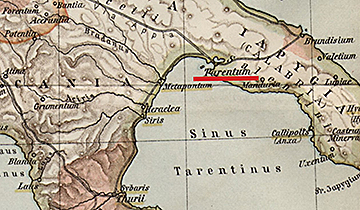|
Pyrrhic War 280-275 BC
The Pyrrhic War is also called the
Tarentine
War.
|
|
Some say that the Pyrrhic War was
fought for ten years, from 282 to 272 BC.
What's Pyrrhic and What's Tarentine?
Pyrrhic
- Of, pertaining to, or like that of Pyrrhus. Pyrrhus was the name
of the king of Epirus in Greece.
Tarentine
- Of, or pertaining to Tarentum.
Tarentum is today's Taranto, or Taras, if you speak Greek. Tarentum
was a Spartan (Greek) colony on the southern Italian coast.
Here is Tarentum on a map:

Map Location Ancient Tarentum, Southeastern
Italy
Click map to enlarge
If you refer to a Tarentine, you are
talking about an inhabitant of Tarentum.
Who Fought the Pyrrhic War?
Tarentum vs. Rome |
Why Was the Pyrrhic War Fought?
Roman warships
cruised in the bay of Tarentum to protect Thurii
(see map above, lower left) and thus
violated an old treaty with Tarentum, which
forbade the Romans to sail beyond the Lacinian
Promontory of Croton.
In A Critical
History of Early Rome, Gary Forsythe enlightens
us further,
This "old treaty"
must be the pax which according to Livy
(8.17.10) the Romans concluded with King
Alexander of Epirus during his Italian adventure
of the late 330s BC, when he intervened to
protect the Greek cities of the Ionian Gulf from
the incursions and expanding pressure of the
Lucanians and Bruttians (Cary 1920, 165-70).
The
treaty was not designed to restrict Roman
seaborne commerce, but only to protect the
Greeks of southern Italy from Roman naval
attack.
In any case, the
Tarentines weren't shy, and quickly sank five of
the ten Roman vessels.
Rome sent an
embassy which was insulted by the Tarentines.
Rome was foaming
from the mouth, declared war, and Tarentum asked
 Pyrrhus to come
over and help out.
Pyrrhus to come
over and help out.
The Major Battles of the Pyrrhic War
280 BC - Battle of
Heraclea - Pyrrhic Victory
279 BC - Battle of
Asculum (today's Ascoli Piceno) - Pyrrhic Victory
275 BC - Battle of
Beneventum (today's Benevento) - Roman Victory
Who Won the Pyrrhic War?
Rome won the
Pyrrhic War.
What's a Pyrrhic Victory?
After winning the
Battle at Asculum, in which Pyrrhus lost many
men, Pyrrhus said that one other such victory
would utterly undo him. This became the phrase
Pyrrhic victory.
Tarentum's Fate
Rome took Tarentum
by siege in 272 BC.
More History
|